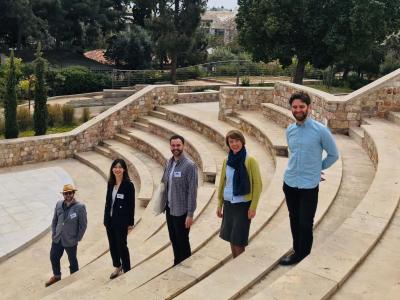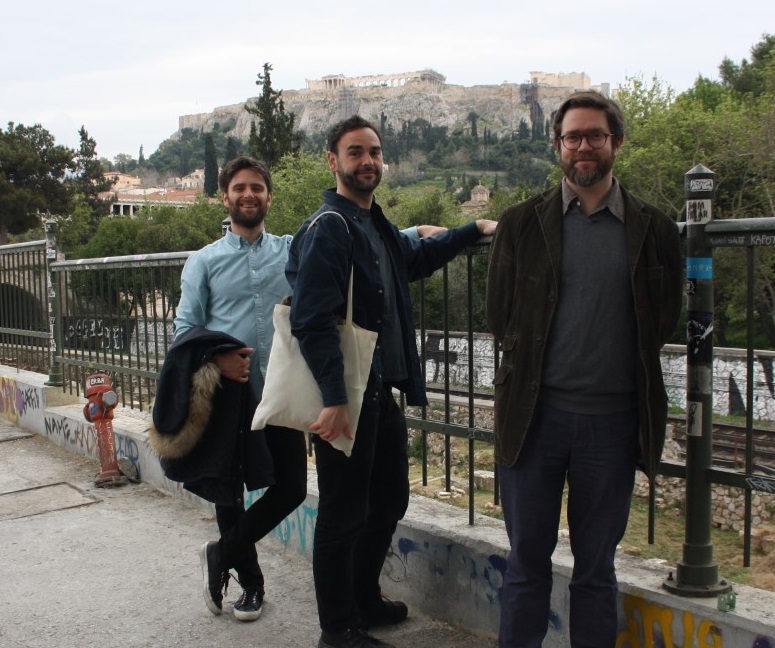
On Thursday 4th and Friday 5th April, a contingent of IASH Postdoctoral Fellows attended the ECHIC Conference in Athens, Greece. ECHIC (the European Consortium for Humanities Institutes and Centres) is a university-based initiative to organise European Research Institutes, Humanities Faculties and Centres for the Humanities. The conference addressed the interface between humanities and the arts within Europe in a globalised world, focusing on the creative industries as a paradigmatic topos of such confluences. It also reflected on questions about the relation between creative economies and cultural democracy, and at a more fundamental level, of the relation between creativity, ethics and politics which cut across boundaries between the Humanities, the Arts and Social Sciences and speak to contemporary concerns beyond academia.
The opportunity to join a group of IASH colleagues to travel to the European Consortium for Humanities Institutes and Centres in Athens was truly one of the highlights of my IASH fellowship. The five of us stayed in a large apartment in the Blue Condominium in the neighbourhood of Exarhia, famous for both anarchy and street art. A lively suggestion to Smash the G20 greeted us each evening on our return to our accommodations. Built in 1931, the Blue Condominium was the first high-rise constructed in Athens. Since then, it has been the home of Greek artists and intellectuals and twice survived detonation attempts during the Second World War. These surroundings were a constant reminder of modern Greek history and of the difficulties the country has faced over the past decade in particular.
These latter struggles informed the conference theme of cultural democracy, and one of the great pleasures of the conference was the opportunity to think through this theme in the company of such an international group of scholars. Myrsini Zorba, Greece’s Minister of Culture and Sport, explained the close connection between cultural democracy and political democracy: “Democracy cannot develop in the restricted and narrow framework of political representation. Without cultural meanings, political life remains out of the prospect of people’s lives and experience, and therefore distant and indifferent to citizens.... The new social movements have brought to light precisely this distance, this cultural asymmetry, which duplicates social inequalities and cultural discriminations.”
This framework offered a very useful way to think about my own work to develop a cultural centre and artist residency in a small community in northern Canada. My paper presented this work, asking how such efforts can promote equitable public engagement with and enjoyment of culture and the arts. How can it offer an inclusive venue for cultural expression and reconciliation in a colonized landscape? I received excellent feedback on my presentation, including a conversation with Dr Lisa Gee at King’s College, University of London, who offered valuable suggestions for developing equitable hiring practices and drawing in marginalized groups. I was also pleased to meet Dr Tünde Varga, a researcher from the Hungarian University of Fine Arts in Budapest, whose work is also concerned with equality in the arts and who has since offered to put me in contact with artist groups working to promote cultural democracy in Hungary. After touring the Acropolis and the various archaeological museums (and eating plenty of kalamari), I left for Edinburgh with some Nobel Prize-winning poetry, a book on Greek art and a large bag of oranges for the IASH crew. My only regret is that I won’t be able to join next year’s trip!
Paper Title: 'Industrialisation of Pleasure Gardens and Paradise: Emergence of Roof Gardens at Department Stores in Korea during the 1930s' This study explored the emergence of roof gardens at department stores in Korea during the 1930s. By tracing the process through which Le Corbusier’s five points of modern architecture, including roof terraces, were introduced to Korea, this paper demonstrated that the roof terrace was recognised as a new architecture and outdoor space for all social classes. Through an analysis of drawings and photos of the roof gardens at Mitsukoshi Department, the first Japanese department store in Korea, and Hwasin Department, the first Korean department store, this study revealed that department stores developed roof gardens from roof terraces by adopting the features of pleasure, such as the commodification of culture and provision of an image of paradise as a way of escaping from everyday life. In conclusion, this paper focused on the roles of department stores, which were not governmental organisations or public bodies, in accelerating the creation of roof gardens and thereby producing semi-public spaces in the early 20th century.
After receiving comments and questions from the audience, I was surprised that the old roof garden at Selfridges London was not well known in the UK, and thus I realized the necessity and significance of the comparative study on emergence and of roof gardens at department stores in the world and on their relationship in the early 20th century. In addition, this conference provided me a meaningful opportunity to share and compare the current policies and visions of green spaces between Korea and European countries.
The keynote speech by Prof. Rick Rylance led me to go beyond the disciplinary boundary and draw on the roles of the humanities in driving society to be inclusive and social. The Keynote Project Presentation by Prof. Max Saunders and his colleagues at King’s College London guided me to see the forefront of research with new media, and it interested me because the project started with questions on self-reflection, not just with technological methods. Above all, what I focused on was Dr Tünde Varga’s presentation, the ‘Creative Industries and Urbanism,’ in Panel 4. Despite the difference in locations and periods, her research and my research share the idea that non-public bodies such as economic powers or artists could provide public spaces or take the lead in sustainable urban regeneration. Thus, during my trip to Budapest this week, I will meet her at the Hungarian University of Fine Arts and discuss the mechanism of recent urban projects driven by the creative class in Budapest.
Lastly, in 2019, on the 100th anniversary of the establishment of the Bauhaus, I was pleased to see its influence on Athens during my stay at a Bauhaus-style building. I recalled the fact that the founder of the School, Walter Gropius, refused to teach architectural history at Bauhaus, claiming to cut off from history. The stay itself and the surrounding area, which seemed to remain in the past without modification or addition for today, gave me a chance to think about and clarify the significance of history in making connections current needs with old grounds, like a palimpsest.

The conference theme of Creative Industries and Cultural Democracy was a generative framework through which to present my research and open up a discussion around the “performance hangout”, a concept I am developing through my artwork and practice-based research. The performance hangout is a social and theatrical mode of relations and aesthetics, which uses “live fictioning”, altered duration, non-productivity and “being together” as a means of interrogating the blurring of work and leisure under neoliberalism, the co-option of avant-garde tactics by the fascist right, and the corporate imperative "to participate" within current democratic systems and institutions. My proposition was whether the "performance hangout" (a concept still very much in process and open to inflection) might open up an alternate space-time, or be used as a tool for imagining an alternative to our neoliberal present (but not only this!).
Thinking through the ‘hangout’ as a mode of inhabitation tested across a history of experimental theatre and counterculture where “nothing really happens” and its more recent re-animation in the form of the online and virtual hangout designed to enable communication across disparate networks, my paper explored a re-employment of the theatrical “fourth-wall”, non-accumulative choreography and relaxed spectatorship as an alternative to arts’ “social turn” (Claire Bishop) and the neoliberal imperative of “impact” and “engagement” in arts’ and academic infrastructures in the UK. It asked what kind of art and life might be imagined beyond such agendas (what would this look like? what would this entail?): without losing the fantasy of unity, erotics, or the luxury of time beyond work and leisure.
My presentation intersected with a number of projects discussed by delegates across the conference, but most pertinent to my research was Prof. Rick Rylance’s (Vice-Chancellor for Research and Dean of the School of Advanced Study, London University) suggestion of a desire to “move beyond critique”; and a curious proposal to “learn poems by heart” by Dr Richard Hayes (Waterford Institute of Technology, Ireland) in his presentation 'Culture and Resistance: the Creative Industries and the Neoliberal State'. I left thinking about the potential of “non-productivity”, of returning to “outmoded” practices and romantic gestures with new purpose and insight. But most significant perhaps was the power blackout, which happened several times on the first day, and which instigated forms of sociality and democratic practice amongst delegates in the darkness, which institutional systems cannot strategise… chatter with strangers, and collectively negotiating the use of personal mobile phones to light the speaker - the room. It left me with a feeling that democratic potential lies in these “undercommons” (Stefano Harney and Fred Moten) in the darkened edges of theatres, performance hangouts, and institutions – a room of no requirement.
Paper Title: ‘The Tyranny of Cool: Orthodoxy, Heresy and the 1960s Counterculture’ My paper was an extension of the research I’m doing at IASH into experimental literary movement, The Beat Generation. It used the Beats to explore the emergence of progressive identity politics in the 1950s and 60s and to consider what happens to heretical cultural ideas when they enter the mainstream and come under fire from new heretical movements. It ended by outlining lessons to be learned from this early counterculture about how best to respond to a new counterculture emergent from the right today.
The presentation drew interesting questions relating to art and political rebellion, to the mainstream commercial absorption of heretical cultural values, and larger issues of racial and class identity politics. I discovered common ground with my co-panelists Dr Richard Hayes (Waterford Institute of Technology) and Dr Tünde Varga (The Hungarian University of Fine Arts) on questions of literary obscenity and the inefficacy of avant-gardes. I also found it useful to re-connect with main conference organiser, Dr Angeliki Spiropolou (Institute for Advanced Studies in the Humanities, London) whom I’ve met through our common work in modernism studies, and to meet and exchange ideas for collaboration with professor of theology, Barbara Törnquist-Plewa (Lund University).
This was an intimate, varied and interesting meeting of academics. Although the conference topic was broad, which produced quite a range of panels, it was held together by a coherent focus on the utility of the arts and humanities in uncertain times. Despite a few issues with power and sound, I found the event to be well run, and our hosts extremely welcoming.
